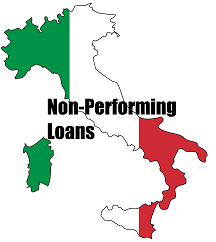
Bad Loans In Italy A Big Problem
The U.K.’s recent vote to leave the EU has shed some additional light on existing weak spots in the European economy. One of those weak spots is Italian banks. From The Wall Street Journal:
Britain’s vote to leave the EU has produced dire predictions for the U.K. economy. The damage to the rest of Europe could be more immediate and potentially more serious. Nowhere is the risk concentrated more heavily than in the Italian banking sector. In Italy, 17% of banks’ loans are sour. That is nearly 10 times the level in the U.S., where, even at the worst of the 2008-09 financial crisis, it was only 5%. Among publicly traded banks in the eurozone, Italian lenders account for nearly half of total bad loans.

Some Calling For More Bailouts
The EU has formal dos and don’ts when it comes to assisting financial institutions. A dialog is taking place about those rules. From Bloomberg:
Italy’s banking crisis could spread to the rest of Europe, and rules limiting state aid to lenders should be reconsidered to prevent greater upheaval, Societe Generale SA Chairman Lorenzo Bini Smaghi said. “The whole banking market is under pressure,†the former European Central Bank executive board member said in an interview with Bloomberg Television on Wednesday. “We adopted rules on public money; these rules must be assessed in a market that has a potential crisis to decide whether some suspension needs to be applied.â€
The term “backstop†is the politically correct way of saying bailout, something that may not be welcomed by taxpayers, especially given the current tone of the electorate. From Bloomberg:
Bini Smaghi said on Bloomberg TV that Europe’s banking market faces the risk of a systemic crisis unless governments accept the idea of taxpayer money as the ultimate recourse. Any intervention should be as swift as possible, he said. Both Italy and Germany have too many banks that are not profitable and more consolidation is needed, he said. Italy must do more to deal with non-performing loans, and Prime Minister Matteo Renzi will have to take politically unpopular steps, including encouraging mergers that will lead to job cuts, Bini Smaghi said. “What’s needed is a European solution,†he said. “So far, we’ve had national solutions. We need a clear backstop.â€

